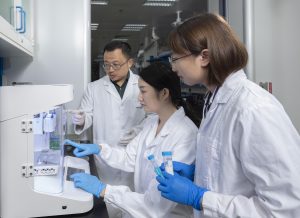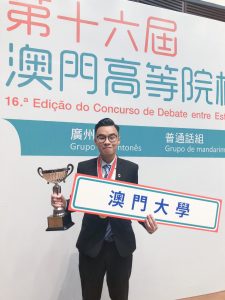The year 2021 marks the 40th anniversary of the University of Macau (UM). The anniversary slogan, ‘Set sail anew on the ruby jubilee’, reflects the universityʼs goals of nurturing talent and serving the community with impactful research. In this issue, we interview several UM members, who share with us how their work contributes to that vision.
Designing Quantum Chips
Advanced materials is one of the key emerging research fields at the university. The faculty and students in the university’s Institute of Applied Physics and Materials Engineering are working hard to develop new materials, such as green-energy materials, biomedical materials, and functional nanomaterials.
A team led by Prof Ian Hou, who specialises in quantum information and computing, is working to develop a quantum chip. ‘Our biggest goal now is to design the first quantum chip developed entirely in Macao and contribute to quantum computing research in China,’ says Prof Ian. ‘The quantum chip we are developing is different from traditional chips. It will be the result of interdisciplinary collaboration that involves materials science, theoretical physics, mathematics, and computational science. If we can meet our goals in scalability and practicality, we will be able to see a substantial increase in the computing power of computers. And if that happens, it will be a game changer for many applications that depend on complex computing, such as message encryption applications.’
You Zeyon, Prof Ian’s doctoral student, obtained a bachelor’s degree in electrical and computer engineering from UM and a master’s degree in electrical engineering from the University of Edinburgh. He returned to UM in 2019 to pursue a PhD, with a focus on quantum computing. ‘It is the most cutting-edge and challenging research area,’ says You. ‘My hope is to apply what I have learned to develop innovative inventions that are useful for ordinary people, to promote industry-academia collaboration, and to create value for society.’
UM has developed rapidly in recent years. It is now ranked 201-250 in the Times Higher Education World University Rankings, and is one of the best universities in the west of the Greater Bay Area. In March 2019, UM established the Zhuhai UM Science and Technology Research Institute in Hengqin, which is the university’s first institute for industry-academia collaboration in the Greater Bay Area. The Master Plan of the Development of the Guangdong-Macao Intensive Cooperation Zone in Hengqin, announced in September this year, mentions the establishment of a high-quality industry-academia collaboration centre in Hengqin for UM and other higher education institutions. UM will seize the opportunity to move technological innovations from the laboratory to the market. Prof Ian is confident about UM’s future development and looks forward to UM playing a greater role in the development of the cooperation zone. ‘The cooperation zone not only provides software and hardware for R&D expansion, but also has high-tech enterprises that can provide the conditions necessary for the commercialisation of our R&D projects,’ he says.
‘Chunming Tong Sui’
UM’s Institute of Chinese Medical Sciences (ICMS) aspires to be a world-class platform for Chinese medicine quality research and innovative drug research and development. Prof Wang Chunming and his research team are working tirelessly on what they refer to as ‘Chunming Tong Sui1’. Recently, the team was excited to discover that the polysaccharides in Chinese medicine could be used to design biomaterials, one of which preferentially supports vascular endothelial cell adhesion and promotes vascular growth and wound healing. Once applied clinically, this discovery is expected to provide a new method of treatment for a variety of diseases, including peripheral vascular disease. The ‘polysaccharide’ is what Prof Wang and his team often refer to as ‘sugar water’, hence the name ‘Chunming Tong Sui’. ‘Tong Sui’ is a Cantonese term for sugar water.
Prof Wang’s team has a great passion for promoting Chinese medicine industry and research. The excellent research environment at UM, the university’s advantage of having an institute for industry-academia collaboration in Hengqin, and the opportunities brought by the development of the cooperation zone, will create favourable conditions for the team to realise their dream. ‘Our biggest mission now is to develop new biomaterials to treat diseases, and to use the ‘sugar water’ to restore patients’ tissues and organs to their healthy state,’ says Prof Wang.
Mu Ruoyu, a PhD student in the ICMS, joined Prof Wang’s team in 2018. She has published six papers in journals indexed by the Science Citation Index (SCI) in three years and her main research interest is the role of macrophages in chronic wound healing. ‘UM has laid a solid foundation for me to pursue my dreams. I hope one day my research results will be applied clinically to help patients,’ she says. Chen Jiaxi, a master’s student in the ICMS and another member of Prof Wang’s team since 2020, says being a researcher in life sciences has always been her dream, and her ultimate goal is to uncover a mechanism or develop a new drug. ‘During my time at UM, I have become very clear about what I want to do in the next decade and even for the rest of my life,’ says Chen.
A Psychology Student’s Dream for Technological Innovation
Cen Bangjie, a fourth-year student of psychology, began using the university’s entrepreneurial resources to pursue his dream in his freshman year. Although engineering was not his chosen major, he has always dreamed of improving people’s health and wellbeing with innovative technology. ‘Studying psychology helped me understand more about the motivations of human behaviour,’ says Cen. ‘Such knowledge comes in handy in running my own company and also helps me grow as a person.’ During his freshman year, Cen founded Zidian Technology Co Ltd through the university’s Centre for Innovation and Entrepreneurship (CIE), with the goal of developing an air disinfection technology. Last year, he received an award for outstanding young entrepreneurs in the Guangdong-Hong Kong-Macao Greater Bay Area (GBA). ‘The cooperation zone provides enormous opportunities for the tech industry and young people who want to join this industry,’ says Cen.
As a child, Cen witnessed how his grandfather risked his own life rushing into a burning building to save other people, so he dreamed of becoming a fire fighter just like his grandfather. Although that path came to a dead end because of his physical condition, the air disinfection products his company invented are saving lives during the pandemic, which he considers as a roundabout way of realising his childhood dream. Cen says that thanks to UM’s entrepreneurial platform, innovative technologies developed in Macao are beginning to gain more recognition in society. ‘The CIE has helped me grow from an inventor who knew nothing about the world of business to an entrepreneur who can take charge of his own business,’ says Cen. ‘This experience gave me more confidence to overcome all obstacles on the road of pursuing my dream.’
Making the World a Better Place
Jonathan Ng, a fourth-year student in the Department of Accounting and Information Management, always wanted to give back to society using his professional knowledge. ‘At UM, I have gained professional knowledge and skills in accounting, as well as the ability to deal with emergencies, to collaborate with others, and to learn on my own,’ she says. ‘I also joined the Cantonese Debating Team, which helps deepen my understanding of society, national policies, and international issues through debates on different topics.’ Ng also praises UM for providing many opportunities for students to learn more about society so that they can initiate meaningful changes. ‘I seize every opportunity to improve myself so that one day I can help make the world a better place,’ says Ng.
Ng thinks the master plan will provide many opportunities for accounting industry practitioners in the GBA. ‘After graduation, I will consider finding a job in the GBA, although it means that I will face fierce competition, not only from my peers in Macao, but also from accounting professionals who studied in mainland China and other parts of the world,’ says Ng. ‘But I am confident that I will be able to carve out a niche for myself in the industry.’


